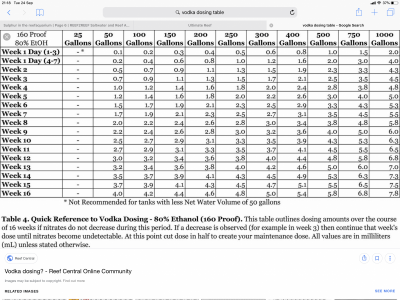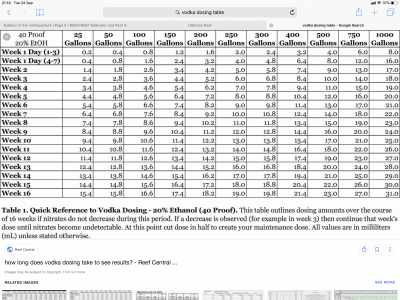All information is available in the Makazi Baharini wiki. R2R does not allow me to link to the information and has removed all links to the knowledgebase which I have used in the past as the website is considered to be a commercial website because it contains a donation button and because I participate by adding information to the wiki.No, we do have to test DOC if we want to know the numbers. And to be able to compare with scientific papers. Adding a carbon source doesn't mean you get too high levels in the tank, if the level was low to begin with.
Just saying too much may kill corals isn't really saying anything. Too much of anything will kill the corals.
What is the natural balance in a reef tank for C:N? Is it the same in every tank? How do you meassure that ratio?
I don't want to be a bad person, but if you claim things you need to explain them a bit more IMO. Specially when claiming a method that's been around for at least 15 years is so bad it can kill corals, even if many people, me included, have used the method for more then 10 years.
If you mean overdosing a carbon source, I'll agree directly. That might kill corals.
I do not claim a thing! We just provide non commercial information about managing a reef aquarium and why , for free!
We just share aproved information we collected, in the first place for personal use, for the development of a high nutrient mixed reef system. Nitrogen and nutrient management based on controlled high input and high output . We solved our nitrogen problem, now we are occupied solving our other nutrients problem.
How overdosing is prevented? One probably does not know how many of a dose is actually used and removed when the next dose is added. As far as I know doses are still based on trail and error, without being able to recognize the errors.
If doses are based on the nitrate level, a to high C:N ratio is easily obtained. Bacteria use ammonia-nitrogen and not nitrate-nitrogen, the C:N ratio for dosing is based on TAN.
To determine a dose one has to define what is an overdose.
What is considered an overdose? Enough to mess up the complete balance in the aquarium? Enough to create a bacterial bloom? Enough to remove nitrification and denitrification capacity? Enough to inhibit a coral to direct its nutrient supply? Enough to kill coral?
My opinion any dose which removes the natural limited availability of organic carbon may be considered an overdose as most if not all microbial communities and holobionts are based on limited availability of organic carbon for to be able to control their food supply, including corals.
I do not add any supplemental organic carbon as carbohydrates. i have no need for to determine a dose. The only reason I would consider to use supplemental carbon is when confronted with an acute ammonia build up problem but as I use bio-filters I can easily adjust the carrying capacity as needed. If I was obliged to dose, with a gun on my head, I would base the dose on the daily nitrogen overproduction.
When an eco-system has found its balance based on unnatural high organic carbon availability it may not be able to adapt to natural circumstances when needed.
In aquaculture, carbon dosing is used for monocultures very succesfully since the seventies and carbon dosing is well documented. A lot of research has taken place, about everything is known.























